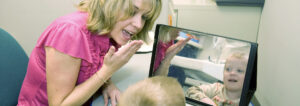Coughing, choking, or pain when swallowing? Our Osceola outpatient specialist explains what this could mean

Back to physical health resource hub
Have you or a loved one ever experienced difficulty swallowing? The feeling of food being stuck in your throat? Increased coughing, or even choking, when consuming drinks or food?
If you have experienced any of these symptoms, it may be a sign you have dysphagia. Dysphagia is the clinical term for difficulty with swallowing. You may have difficulty if you have noticed:
- Weight loss or dehydration
- Increased time needed for consuming a typical meal
- Pneumonia
- Coughing during, before or after eating/drinking
- Sensation of pain or food being “stuck”
- Choking
- Wet or gurgled sounding voice after eating/drinking
Why do I have difficulty?
Swallowing is a complex action with several nerves, muscles and structures involved. The actions of these elements are controlled by the brain, therefore, when damage or changes occur to any of these elements, or to the brain itself, it can result in swallowing impairments.
Difficulty swallowing can occur for a variety of reasons. Your swallowing may change as a result of a traumatic event (brain injury, stroke, etc.), a progressive disease (Parkinson’s, ALS, Multiple Sclerosis, etc.) or many other conditions. The following medical conditions are some of the most common associated with changes in swallow function:
- Traumatic brain injury
- Stroke
- Diabetes
- GERD
- Dementia
- Cancer or cancer treatments (chemotherapy, radiation, surgical resections of areas related to swallowing)
- COPD
- Asthma
- Psychiatric conditions (i.e. PTSD, Bipolar disorder, Schizophrenia, etc.)
How do I get help?
Eating is an essential part of life. Not only does eating supply the hydration and nutrition for our bodies, it’s also an important element of social gatherings and contributes to emotional well-being. Changes in swallowing can feel especially distressing because it impacts so many parts of your daily routine and life.
If you feel you or a loved one are experiencing difficulty swallowing, you should reach out to your primary care provider. Your doctor can provide a referral for you to see a Speech Language Pathologist (SLP). An SLP will assess your swallow function and refer you to obtain imaging of your swallow if needed. Imaging helps the SLP determine what impairments exist and what steps are required to begin improving your swallow. If impairments are present, the SLP will provide you with education and information, strategies to increase ease and safety during meal times and/or exercises to improve your overall swallow function.
At our Osceola outpatient clinic and across the Brooks organization, our Speech Language Pathologists have specialty training and certifications to provide you or your loved one with best care. Our team works hard to develop a patient centered plan for treatment, taking into consideration the unique needs of you, your family and your health status.
Although changes in swallowing may be a part of your health journey, our therapists will work hard to provide you with the highest quality of life possible at every stage of your journey.


